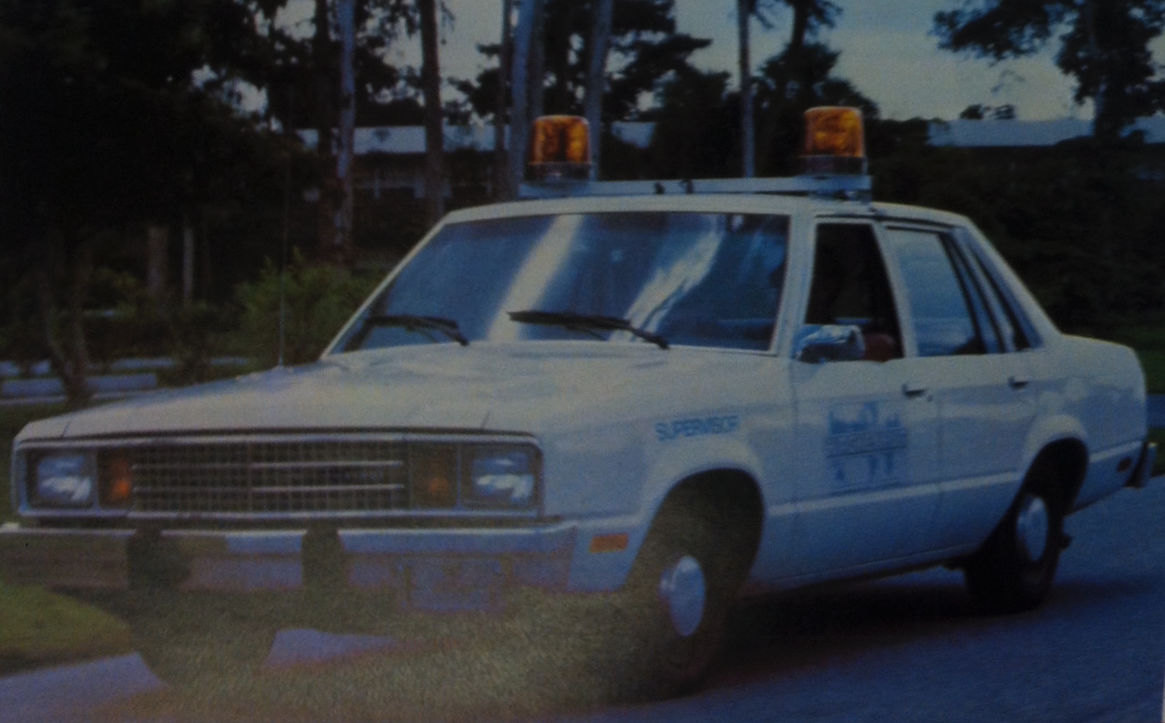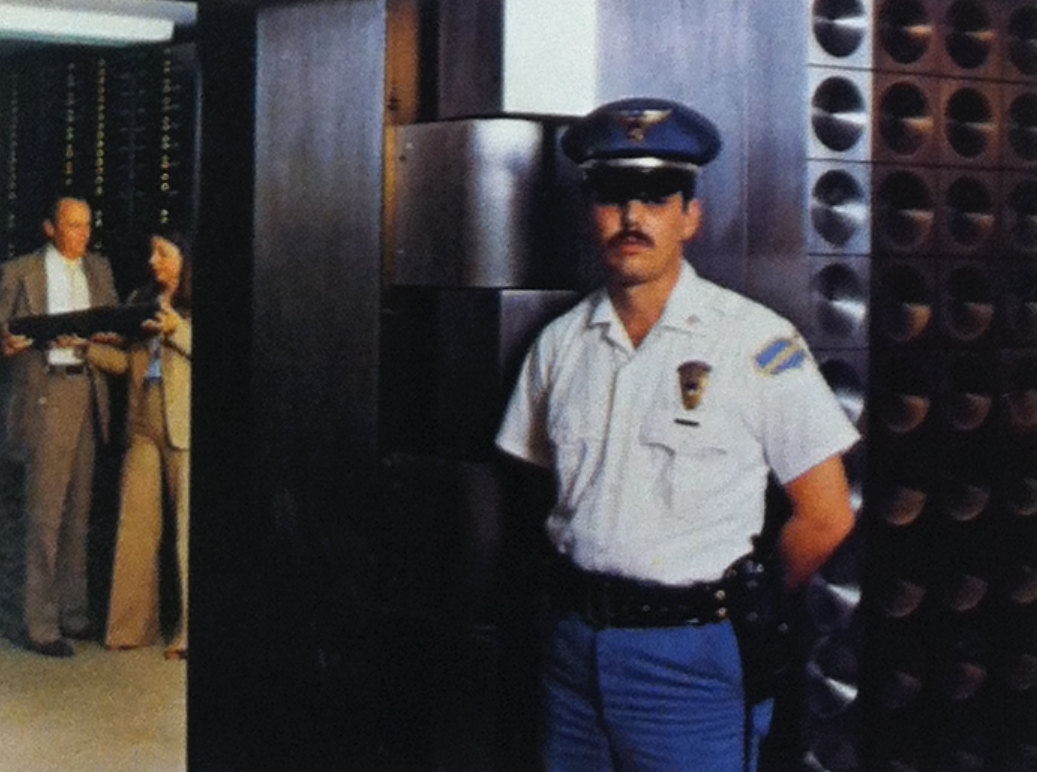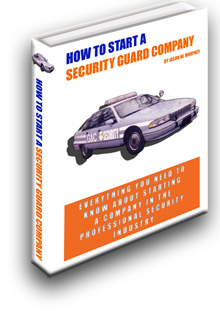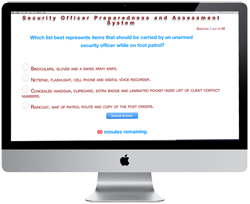 Practice Test
Training
Regulations
Security FAQs
Member Support
Sign In
Join
Practice Test
Training
Regulations
Security FAQs
Member Support
Sign In
Join

LAST EDIT April 15, 2023
The Rise and Fall of Wackenhut Security

Listen to Content From This Article.
If you went to work in private security during the 80s or the 90s, there's a pretty big chance that you got your start at one of the big three American security companies: Pinkerton, Burns or Wackenhut.
This is the story of the last of the big three: Wackenhut. The American security company that outlasted its two competitors and became the last of the big private security firms to carry the name of their founder—giving way to the coldness of the massive, international corporations with the strange acronyms and constantly changing branding.
In 1954 when George Wackenhut quit the FBI he set in order a series of events that impacted many of us who would eventually work for his agency.
Wackenhut grew up near Philadelphia and served in the Army Corp of Engineers during World War II. After the war he joined the FBI. In 1954 he resigned from the FBI and soon thereafter he and three other ex-FBI agents created their own investigations firm in Coral Gables Florida. They called their company "Special Agent Investigators." Their use of this terminology, and the fact that they were ex-agents, caused a bit of concern within the FBI where it was feared that the new agency was attempting to profit off of their former-FBI status. Bureau officers were concerned that clients of this company might be led to believe that these agents still had some affiliation with the FBI and FBI agents were instructed to avoid assisting the firm.
These weren't the only early challenges faced by Wackenhut Special Agent Investigators. At one point in the early days of the company, the agency's assets supposedly consisted of just $1.56. The agents reportedly had to pass the hat just to make payroll.
In 1958 Wackenhut took sole control of the company and called it Security Services Corporation—an indication that the company would be offering more than just investigative services. Reportedly, after working in his agency's office during the day, he would personally work at night, on shift, as a security guard.
Wackenhut's persistence soon paid off as Wackenhut obtained a major security contract with National Airlines of Miami. Not long thereafter Wackenhut declared that his company had become licensed in 10 states and was the fourth largest company of its type in the nation. Indeed, the company's October of 1962 newsletter reflects wide-ranging activity from Kansas to Puerto Rico.
Financials show the company's gross revenues starting at just $89,700 in 1955, surpassing two million dollars in 1960 and 17 million by 1965. The company won high-profile government contracts including the Kennedy Space Center in Florida—believed to have been a 350-man security police force that had previously been operated by Pan American and worth $44 million over seven years—and nuclear test sites in Nevada.
Wackenhut took the company public in 1966 and that same year he opened the company's first international office; in Venezuela.
Entitled "The soaring 60s," the bar chart on the cover of the company's 1969 report graphically highlighted just how much the revenues had exploded. In 1969 the company exceeded annual revenues of $48 million dollars with approximately 6,000 clients and 70 offices; and, the company was well on its way to massive diversification. With the acquisition of several other security-related and security-adjacent companies, Wackenhut's services now ranged from alarm systems to security auditing to fire fighting and prevention. This allowed Wackenhut to become less dependent on its government contracts and dropped the government-dependent percentage of revenue down to just 14%.
In the 70s, Wackenhut continued its growth as one of its subsidiary companies won the contract to secure the 800-mile Alaska pipeline both during its construction and afterwards.
By 1980 the company's annual revenues had reached 148 million dollars with 9,000 clients and 14,000 employees. At this time Wackenhut had diversified into high-technology electronic submissions with its Wackenhut Series 4000 computers to enable the reduction of "human" guards. So, as you can see, the promise of technology replacing human officers has been ongoing for some time now.
The company also boasted of its success in pre-departure screenings at airports. It credited this program as perhaps being a reason for the "virtual elimination" of the airline hijackings that had plagued American airports in the early 1970s. Wackenhut continued winning and working high-profile government contracts such as the Rock Ridge Nuclear Weapons site in Colorado, various U.S. embassies and was even known to provide paramilitary services.
In 1983 Wackenhut's three-year, $81 million contract at the Savannah River nuclear weapons facility in South Carolina was the largest paramilitary security contract ever awarded by the U.S. government. Wackenhut outbid 18 other bidders to win the contract and brought in 460 uniformed security professionals and 50 administrative support personnel as part of just this single contract.
In 1984 George Wackenhut attempted to take his company private for $24 per share. This would have allowed him to cash out and convert his holdings to cash. George and wife Ruth Wackenhut's shares would have been worth about $49 million because at this time they still owned 53.3 percent of the company; but, financing fell through and the company remained public. That year, for the first time in many years, Wackenhut posted a loss: A loss of $1.8 million in 1984. $891,000 of that loss was spent on studying the privatization plan—even though it didn't work out.

But, Wackenhut bounced back. In 1987 Wackenhut created a subsidiary company, Wackenhut Corrections Corporation (WCC) to oversee its private prison contracts. Facilities under WCC's control included prisons in Australia, England, and Puerto Rico, as well as six states in the United States. In the 1990s, that subsidiary would become a public company of its own, with Wackenhut retaining a majority ownership.
By the 1990s a series of high-profile controversies began to create a bit of a toll on the company's public image.
Remember the contract to protect the Alaska pipeline? Well, in 1991 the pipeline company issued a public apology after it was determined that they had used Wackenhut investigators to spy on a prominent critic of the pipeline company. The President of the company said the spying was 'wrong' and he pledged never to do it again. The matter resulted in congressional hearings and brought less-than optimal public attention to Wackenhut.
Additionally, incidents at Wackenhut prisons such as a 1990 escape of a suspected drug kingpin from a Texas prison and a 1999 riot in its New Mexico prison brought unfavorable public attention; and, by the late 1990s, some state-level policy leaders appeared to sour on the idea of private prisons altogether. By now, George Wackenhut had handed off the duties of presidency of the company over to his son Richard Wackenhut although George remained the Chair of the Board.
The post 9-11 world with society's new focus on security set to greatly benefit security providers and that perhaps is what made Wackenhut an international acquisition target. International security firm Securitas had already bought Wackenhut's two American competitors, Pinkerton and Burns. Securitas' international rival Group 4 Falck wouldn't be left behind. Group 4 was the number two security company in the world: a $2.5 billion public company traded on the Copenhagen stock exchange. In 2002 they made a $570 million cash offer to buy out Wackenhut. Wackenhut would keep its name but the Wackenhut family would no longer be involved in the business it built.
Though he agreed to the offer and though he received a parting compensation package of $124 million dollars, George Wackenhut described his second thoughts to local reporters: "it's like giving up your baby."
In 2001 Wackenhut was recognized on Forbes' Most Admired American Companies list and it's 2001 financial reports showed 57,000 employees in its security services division and another 10,763 in its correctional services; and, notably, annual revenues of 2.8 billion dollars—quite an increase from the $89,700 of revenue in its first year back in 1955.
But, now, like Pinkerton and Burns Security before it the American-owned Wackenhut would soon become a thing of the past.
For several years, Group 4 continued to preserve the Wackenhut name with their American private sector security services now renamed G4S-Wackenhut; however, the private prison operations were sold off to a group of buyers who renamed it to The Geo Group.
The new G4S Wackenhut organization continued Wackenhut's tradition of iconic uniform branding. They kept what might have been the most unique security uniforms in the history of the industry: The company's Custom Protection Officers (CPOs) wore brown uniforms with a purple on black stripe and gold Wackenhut-styled badges.
The Wackenhut brand received negative attention when a CBS report featured whistleblower testimony about the tendency of G4S/Wackenhut officers to fall asleep while on duty at a Pennsylvania nuclear facility.
That reporting led the facility to terminate the security contract.
In 2010, perhaps to get away from the Wackenhut brand, G4S-Wackenhut would rename itself G4S Security Solutions.
And in 2021 G4S was bought out by Allied Universal. Now one will likely be hard pressed to find any evidence of the Wackenhut name being used at security sites in the United States.
As I was putting together the research for this article, I took note of a news report demonstrating one of George Wackenhut's failures: a community's rejection of his privatized fire fighting force.
Ironically, Wackenhut had given up a career in the public service with the FBI after just three years. As a private company executive he had successfully provided privatized public safety services to many government institutions; yet, at some point, he also somewhat hit a ceiling. America, it seemed, only had so much appetitive for privatized public safety and at some level there was a stopping point. A paramilitary organization guarding a nuclear plant, airport screen services, privatized crash, fire and rescue services at pseudo-governmental entities such as airports, all of these were acceptable, but community-level public safety was another thing entirely.
However, times are changing.
In today's world, when America seems on the path to copying South Africa, where private security companies are thriving, it almost seems as if a path is open for the next generation of George Wackenhuts who will step in and provide a private security solutions to truly fill the void of America's collapsing public safety sector. One almost has to wonder if Wackenhut wasn't just 75 years before his time.
Perhaps America's appetite for privatized public safety services isn't any stronger than it was in Wackenhut's time, but unlike before, now, and in the next few years, it's almost as if Amercia doesn't have any other choice.
Are you ready to start thinking about starting your own security company? Check out this 140 page ebook from The Security Officer Network entitled "How to Start A Security Guard Company". Get your PDF copy while it is still free! Or, order the paperback from Amazon.
How Much Does it Cost to Start a Security Guard Company - The initial investment that should be set aside before start a private security agency. Click to Read
How Much Can a New Security Agency Charge? - The new security agency's pricing strategy. Click to Read
What are the Components of the Security Guard Company Business Plan - The necessary elements of the Security Guard Company's business plan. Click to Read
How to Lower the Cost of the Securty Guard Company's Insurance Premiums - Methods for cutting the cost of insurance and undercutting the price model of the big security companies. Click to Read
How Much Should a Company Charge for Security Patrol? - Methods for charging for patrol route services. Click to Read

SecurityOfficerHQ.com is the exclusive provider of this free 57 page PDF guide. It features just about everything you need to know before taking the exam and includes The Professional Security Officer eCourse. You may get your copy for free right now only at SecurityOfficerHQ.com! Submit your name and email to receive your copy via email or click here to learn more about this guide.

SecurityOfficerHQ.com is the exclusive provider of this free 140 page PDF ebook. Less-comprehensive versions sell for $24, but, for the time being, you may get your copy for free right now only at SecurityOfficerHQ.com! Submit your name and email to receive your copy via email or click here to learn more about the book.

The forty question, free practice exam will test your unarmed security knowledge. It's the perfect test prep for those who must sit an exam before getting licensing.

This free job interview guide is the security officer's must-have resource. Get yours here.
© 2012 - 2026 The Security Officer Network
A Product of the 1918 Media Limited Liability Company
Addr: Thirty North Gould Street 2288
Sheridan, Wyoming 82801
Phone: (307) 461-6079
Red Hirundo Rustica Custom CMS and Testing Engine
Disclosures | Privacy | 307.461.6079